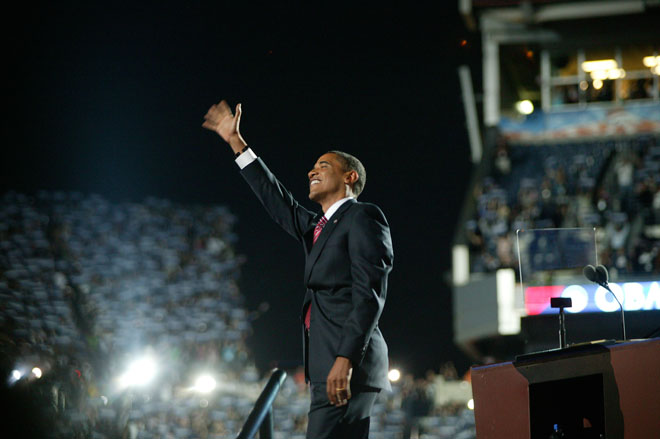After posting huge turnout numbers in 2008, Democrats are going to have a tough time bringing back the base in 2012. You hear it in the streets, you see it in the polls. That’s the conventional wisdom at least.
But among Obama campaign staff, it’s an article of faith that talk of a “base problem” is a load of bunk. Touring campaign headquarters in Chicago last month, aides uniformly dismissed the notion there would be any issue bringing core Democrats back into the fold. A “Washington narrative,” as one person described it to TPM.
“The biggest problem this far out is urgency,” one staffer told TPM. “There’s a feeling of ‘Come on, you need me now?'”
The campaign’s Chicago offices, which boasts over 200 full-time staffers, is overwhelmingly devoted to organizing grassroots volunteers at the neighborhood level in order to get a jump on the general election. Small neighborhood groups are being given personalized goals of voter contacts, phone calls, and other metrics help keep them motivated. Last weekend, they organized more than 2,000 volunteer events around the country to mark the one-year countdown to Election Day.
And while the campaign stresses that its base is still solidly behind Obama, they also are putting a tremendous amount of time and energy into “Operation Vote,” a series of specially tailored programs designed to target Democrats’ most reliable demographics, including women, young voters, African Americans, Jews, and Latinos.
The “Greater Together” program, for example, targets 18-29 year old voters, a group that includes many first time voters but also recent graduates and young professionals.
A surge in youth voting, notoriously one of the hardest groups to get to the polls, was key to Obama’s 2008 win but lately there have been signs of trouble. The Occupy Wall Street movement, which the campaign is loathe to discuss at all, has unexpectedly taken off but there are strong undercurrents of disappointment in Obama’s leadership among its supporters. And the rough economy, Obama’s biggest overall vulnerability, is very real to recent college graduates, many of whom are having a tough time finding work and paying off their student debt.
While Republican opposition has blocked much the White House’s ambitious legislative agenda, the campaign thinks they’ve amassed an impressive set of accomplishments to convince young voters that their enthusiasm in 2008 wasn’t misplaced. The end of the Iraq War, the Affordable Care Act’s rapid expansion of insurance coverage for young adults, and the repeal of Don’t Ask Don’t Tell all are set to figure big in the President’s pitches.
Another issue that the White House is emphasizing more recently: student debt. The President recently issued an executive order aimed at speeding up reforms designed to make student loans easier to pay off. Priorities USA, an independent group supporting Obama’s re-election, ran an ad in Michigan ahead of Wednesday’s Republican debate accusing the GOP candidates of trying to cut student programs.
Hispanic voters, another crucial plank of Obama’s 2008 majority, are another focus for 2012. A number of Latino groups have been extremely critical of the administration’s record, including its inability to get the DREAM Act and comprehensive immigration reform past Congress and its hesitancy to slow a record-setting pace of deportations.
A Obama staffer stressed that Latino advocacy groups’ focus on immigration obscured the tremendous importance of the economy to individual Latino voters, an area where they feel their latest jobs push gives them an edge. While the campaign was counting on bringing the activist community behind them sooner, they’re enthused over a raft of polling showing Latino voters sticking with the president in head to head match-ups with his Republican challengers. A recent Univision poll, for example, showed Obama racking his 2-1 margins among Hispanic voters against Mitt Romney, Rick Perry, and Herman Cain, a number near identical to his 2008 victory. Romney has tacked hard right in his immigration rhetoric over the last few weeks to go after Perry, whose support for allowing illegal immigrants to receive in-state tuition has become one of his top vulnerabilities. And that’s nothing compared to Cain, who has suggesting building a lethal electrical fence around the border.
The campaign expects to have a major edge in Spanish-language media as well, thanks in part to the GOP field’s ongoing boycott of Univision over a spat with Sen. Marco Rubio (R-FL), and will make aggressive use of ads and media appearance to target radio stations as well.
The statistics are still rough: Democrats keep telling pollsters they’re less enthusiastic about voting than Republicans. But the campaign is convinced that once Obama is running against a Republican opponent — and not just an ideal version of himself — their 2008 supporters will return to the fold as ready to help as ever.









